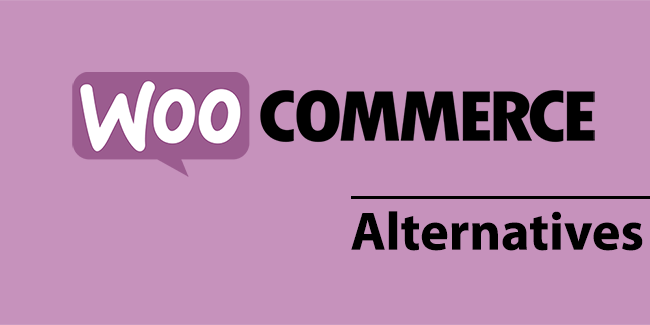Top 5 Best WooCommerce Alternatives In 2024

This article is about WooCommerce Alternatives. If you ask any WordPress expert what the best eCommerce plugin is, they’ll almost certainly say WooCommerce. But what about all the rivalry? Are there any WooCommerce alternatives with greater or more distinct features?
Yes. In some circumstances, yes.
Top 5 Best WooCommerce Alternatives In 2024
In this article, you can know about Best WooCommerce Alternatives here are the details below;
Several WordPress plugins, integrations, and standalone eCommerce platforms include features that make them more user-friendly in various situations.
WooCommerce is still the best all-around solution, as seen by its popularity, but what if you want to set up a multivendor store or offer subscriptions? Some of the WooCommerce alternatives look promising.
We’ll go over several WooCommerce alternatives below that might be a better fit for certain scenarios. We’ll also discuss why they’re superior to WooCommerce and some of the drawbacks.
1.Easy Digital Downloads for selling digital downloads
The moniker Easy Digital Downloads (EDD) says it all. It converts any WordPress site into an online store. Frontend submissions, software licencing, and payment gateways are available as add-ons, but the basic plugin generates a store, receives payments, and controls marketing.
Pricing
The plugin itself is free, but add-ons start at $15.20. Add-on packages start at $108.50 and go up from there.
What it does better than WooCommerce
What it does better than WooCommerce EDD is make selling digital downloads as straightforward as possible. WooCommerce enables digital sales, but its setting process is complicated, and several of EDD’s free advanced features require WooCommerce premium extensions (like Product Bundles). With one installation, Easy Digital Downloads includes a shopping cart, discount codes, customer administration, and data reporting. Furthermore, if you solely offer digital products, your dashboard will be devoid of physical product features. Also check Fulfillify alternatives
Downsides compared to WooCommerce
The disadvantages of WooCommerce EDD are limited to virtual items. WooCommerce is the best option if you plan to sell tangible things in the future. Physical objects are helped by the EDD Simple Shipping add-on, however it is limited (no variable shipping costs, no shipping company integrations, and watered down reporting).
Who should make use of it?
Consider Easy Digital Downloads as a simple approach to offer only digital products. EDD works well with music, eBooks, pictures, and videos.
2. MemberPress, which is used to sell membership subscriptions.
MemberPress is a WordPress plugin that appears to include all of the membership features you’ll ever need. The majority of your subscription or membership operation is set with drip content, subscription management, and fantastic pricing pages.
Pricing
• $129 per year for the Basic Plan.
• $249 per year for the Plus Plan.
• $369 per year for the Pro Plan.
What it does better than WooCommerce
What MemberPress does better than WooCommerce is that it offers premium support.When compared to conventional eCommerce stores, membership sites are an entirely other breed. For quick fixes, the WooCommerce documentation is fine, but there are occasions when you need to speak with a live person.
For full membership functionality, WooCommerce requires additional addons. Although the WooCommerce Memberships plugin is fantastic, you’ll need additional extensions for affiliate programmes, price pages, and other features. Also check iPhone Web Browser
MemberPress is also less expensive.
Drawbacks in comparison to WooCommerce
For fixed-price items, MemberPress lacks a traditional eCommerce store. WooCommerce also supports additional payment gateways.
Who should make use of it?
Anyone who need an all-in-one membership or subscription suite.
3. Shopify for a more straightforward eCommerce experience
Both WooCommerce and WordPress are self-hosted open source platforms. That implies you’ll have to obtain hosting and keep the site updated. For most individuals, this is a good thing, but web design beginners may find it scary.
Shopify can help with that.
Shopify is an all-in-one eCommerce platform that includes hosting, domain names, design, themes, and marketing.
Pricing
• $9 per month for Shopify Lite.
• Shopify Basic – $29 per month
• Shopify costs $79 a month.
• Shopify Advanced – $299 per month
• Shopify Plus should be contacted.
What it excels at over WooCommerce
With all tools in one dashboard, Shopify makes creating a store easier. You never have to agonize about hosting, security, or updates because Shopify takes care of everything.
Drawbacks in comparison to WooCommerce
WooCommerce themes come in a wider range of options. It’s also easy to scale up with WooCommerce because you have complete control over your website. Finally, because Shopify employs the Liquid coding language, complex adjustments are more difficult.
Who should make use of it?
Shopify is an excellent option for complete beginners who want a well-designed, fully functional store.
4. Arcadier to build a multivendor store
From service bookings to retail goods, Arcadier creates a complete multivendor marketplace. It comes complete with unique features such as customer chat windows, negotiation tools, and social logins.
Pricing
• $34 per month for the Starter Plan.
• $68 per month for the Basic Plan.
• $170 per month Growth Plan
• $340 per month for the Scale Plan.
What it excels at over WooCommerce
Multivendor stores, like membership sites, are logistically challenging to manage. As a result, having a platform devoted to multivendor selling, as well as a competent support team, is beneficial.
Multivendor feature isn’t built into WooCommerce, but various plugins make it possible. Even while the plugins (such as WP Marketplace) offer extensive feature sets, you’ll find that some features are lacking, such as support for rented items and negotiating tools.
Drawbacks in comparison to WooCommerce
Arcadier charges a somewhat expensive monthly cost right away. The majority of well-known WooCommerce marketplace plugins offer free versions with reasonably priced add-ons.
Who should make use of it?
Anyone who is building a multivendor site from the ground up. If you’re adding multivendor capabilities to an existing site, WooCommerce with a multivendor plugin would be a better fit. Also check Cheaper SiteGround Alternatives
5. Magento
If you’re lacking a feature in WooCommerce, there’s a good chance an extension can help. Some folks, on the other hand, would want to have every potential eCommerce feature integrated right into their system rather than having to piece together that extension puzzle. Because you don’t have to look for a new plugin to expand your selling prospects, a configuration like this can help you scale your business.
Magento is a good WooCommerce option for people that are more technically savvy and want to move
away from WordPress.
Pricing
The Magento Commerce Starter plan costs $2,000 per month, while the Magento Commerce Pro plan costs $3,417. A limited but free open source version is also available.
What it excels at over WooCommerce
Magento is a robust eCommerce platform designed for larger companies. It’s a complete content management system that includes almost all eCommerce features without the need for plugins or add-ons.
Drawbacks in comparison to WooCommerce
Magento isn’t difficult to set up, but tweaking and designing it takes a skilled developer, whereas WooCommerce is simple to learn.
Furthermore, the Magento Commerce premium edition is costly.
Who should make use of it?
Magento is a terrific choice for larger, expanding companies with complex eCommerce requirements. Magento has legendary customization capabilities, but you’ll need to be a developer yourself or have the funds to hire one.
Which of these WooCommerce alternatives is the most suitable for your needs?
Fortunately, deciding whether or not to use WooCommerce is rather straightforward. While WooCommerce is great for most eCommerce sites, there are times when one of these WooCommerce alternatives can be a better fit (such as when creating a multivendor or subscription site).









